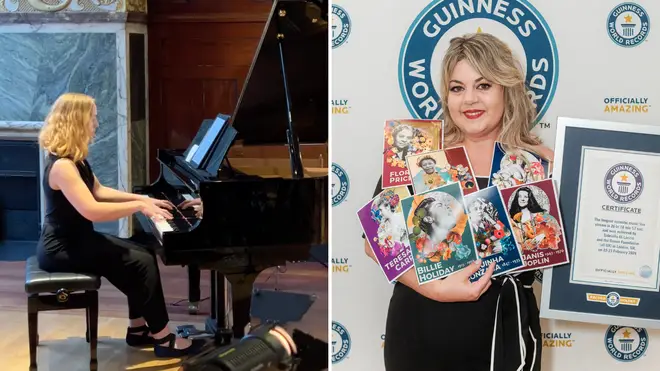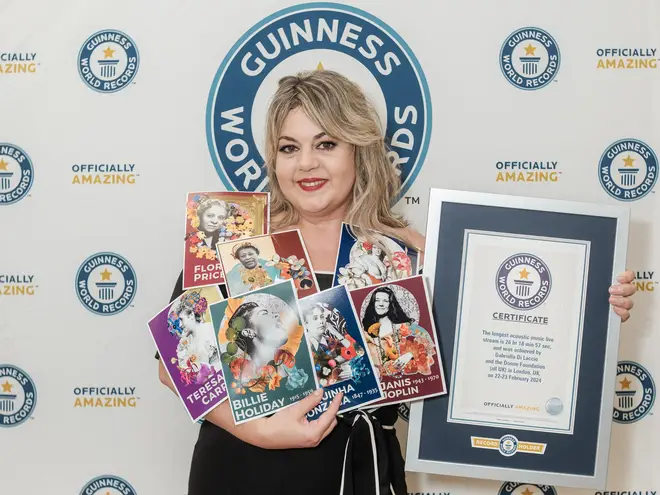On Air Now
Classic FM Breakfast with Tim Lihoreau 7am - 9am
10 April 2024, 09:36 | Updated: 10 April 2024, 09:42

A Guinness World Record attempt saw more than 120 musicians perform over 24 hours of music, all written by women and non-binary composers.
More than 120 musicians gathered in central London on Thursday 22 February, coming together in a Guinness World Record attempt for the ‘Longest Acoustic Music Live-Streamed Concert’.
Over the course of 26 hours, performers took to the stage to perform a variety of music from classical to pop with one uniting theme: every piece of music played had been written by a woman or non-binary composer.
Performers included former Iron Maiden keyboardist Tony Moore, pianist Antonio Oyarzábal, soprano Carolyn Sampson, and baritone Roderick Williams.
“I want to contribute to change,” soprano and organiser Gabriella Di Laccio told Classic FM. “But I think we need to be bigger, because I want to be as big as the people who have the power to make change.
“So in order to create a movement that was bigger than me, bigger than Donne, bigger than classical music, I thought: let’s break a record.”
Read more: 10 women who changed the classical music world forever
The world record attempt, titled ‘Let HER MUSIC Play’, is Di Laccio’s brainchild, as the founder of Donne, Women in Music, a charitable foundation dedicated to amplifying the voices of women composers from across the musical spectrum.
Di Laccio’s inspiration for Donne came in 2018, when she discovered a second-hand encyclopaedia of over 5000 women composers, and realised just how many of them remained unknown.
She uploaded their names to a website, in what she now calls ‘The Big List’. Later that year, Di Laccio surveyed the music performed by the 15 top orchestras in the world and found that only two percent of it was written by women.
The survey became an annual project for Donne, with the percentage of women composer’s music slowly but increasing each year. However, even now including over 100 orchestras worldwide, it still sits at less than eight percent.
“I find the progress very slow,” Di Laccio commented. “And I don’t see the reason. Nobody will convince me it needs to be slow.”
Read more: Nine of the world’s top 20 most performed living composers are women, new report finds

Pianist Antonio Oyarzábal is one of the many musicians campaigning to turn the tide for women composers. Ambassador for Donne since 2021, he has shaped a career around researching, performing and recording music by women.
His journey started at 11, when his harpsichord teacher introduced him to the music of Élisabeth Jacquet de La Guerre, an experience he says he feels “very privileged” to have had. Later exploration led him to the music of Lili Boulanger and Germaine Tailleferre, the sole female member of the group of French composers known as ‘Les Six’.
But the more he discovered, the more he realised he didn’t know. “As I discovered more and more composers, and read and informed myself, and realised all the neglect that’s been going on, then I decided to be more active about it,” he said.
Read more: Who was Lili Boulanger? Meet the inspiring composer who died tragically young
Oyarzábal now spends much of his time undertaking research in order to discover new music.
“I go to the British Library almost weekly and research there,” he says, in addition to time spent scouring online libraries worldwide. “That’s more of an academic kind of work, it’s not so much a performer’s work.
“It really is so necessary to provide more tools and facilitate access to this music in order to incorporate it into recitals.”
Something every music lover can do, Oyarzábal says, is look for diverse composers within the styles of music we already enjoy, particularly as more and more of it is recorded.
“Let’s give it a chance, let’s get out of the comfort zone,” he told Classic FM. “And gradually fall in love with the repertoire. We need to give the chance to audiences to listen to it many times to get familiar with it.”
One risk Gabriella Di Laccio is mindful of, is attention paid to women composers becoming something of a fad.
Referring to 20th-century composer Elizabeth Maconchy, Di Laccio says that she was greeted as ‘The Great Maconchy’ every time she crossed the threshold of London’s Royal College of Music.
“I never heard her name, and I studied there,” Di Laccio told Classic FM. “It’s very scary to see how well respected they were, and how easily they were forgotten.
“This campaign is my call to action. We need to grow this because it can’t be a trend. It needs to stick.”